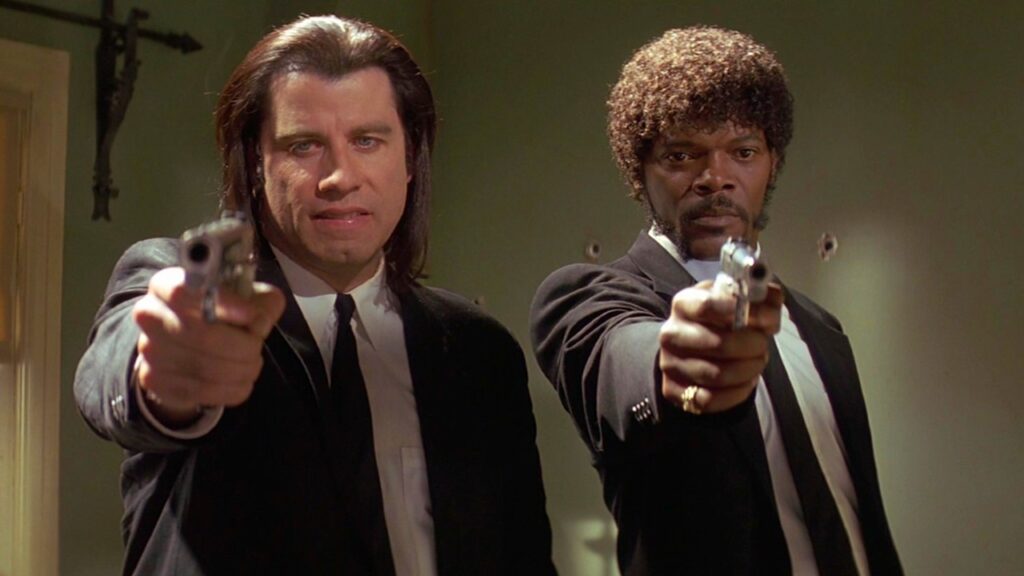Monthly Archives: December 2024
Pulp Fiction: A 30-Year Celebration of Cinematic Brilliance
“Pulp Fiction” did not just change the way we watch movies; it changed the way we talk about them.
Quentin Tarantino’s 1994 opus arrived at a time when cinema seemed to be running out of audacity. Here was a film that had the nerve to mix the highbrow with the lowbrow, violence with humor, and chaos with symmetry.
Thirty years later, “Pulp Fiction” stands as a testament to the elasticity of storytelling and the enduring power of style.
At its core, the film is a love letter to pulp magazines, dime novels, and forgotten B-movies, yet it transcends homage to become something wholly original. The narrative structure remains as daring as it was three decades ago. Tarantino interweaves multiple storylines—each distinct yet interconnected—like a master conductor leading an orchestra of mayhem. The result is a film that defies the linearity of time while remaining emotionally resonant.
John Travolta’s Vincent Vega is a study in contradictions: a hitman who debates the nuances of European fast food but can’t manage a simple escort mission without disaster. Travolta, resurrecting his career with this role, brings a languid charm that is both disarming and deeply funny.
Opposite him, Samuel L. Jackson’s Jules Winnfield is a force of nature, speaking with the conviction of a prophet and the swagger of a rock star. Jules blends menace and introspection in ways that defy expectation. Their conversation about foot massages and divine intervention has been endlessly quoted, parodied, and analyzed—and for good reason. Few films have ever invested so much in the art of dialogue.
Dialogue in “Pulp Fiction” isn’t just a means to an end; it is the end itself. The seemingly mundane discussions about burgers, watch origins, and how to rob a diner become miniature symphonies of tension, humor, and subtext.
Tarantino’s ear for language is unparalleled, and his words are delivered by actors who savor every syllable. Consider Uma Thurman’s Mia Wallace, a character as enigmatic as she is captivating. Her banter with Vincent during their iconic diner scene is a lesson in chemistry and timing. The ensuing dance contest—a moment as joyous as it is surreal—captures the film’s ability to oscillate between the absurd and the profound.
Even minor characters leave indelible impressions. Bruce Willis’s Butch Coolidge, a boxer grappling with fate and loyalty, anchors one of the film’s most harrowing sequences.
The pawn shop scene, which spirals from absurdity to horror, is as shocking now as it was in 1994. And yet, beneath the violence and chaos, there is a thread of redemption running through the film. Jules’s transformation—a hitman who finds God in the middle of a bloodbath—is one of cinema’s most unexpected spiritual arcs. He walks away from the life, leaving us with a sense that change, however unlikely, is always possible.
The film’s technical achievements are no less revolutionary. Cinematographer Andrzej Sekuła captures the grimy glamour of Los Angeles with a painter’s eye for detail. The soundtrack, a jukebox of forgotten treasures, feels as vital as any character in the film. Each song—be it “Misirlou” or “Son of a Preacher Man”—is inextricably tied to its scene, creating moments that are impossible to imagine without the music.
What makes “Pulp Fiction” endure is its refusal to age. It exists outside of time, a cinematic singularity that feels as fresh now as it did in 1994.
Every viewing offers new discoveries, from its labyrinth of pop references to its kaleidoscope of torn emotions. Thirty years on, it is not merely a film but a cultural touchstone, a film school in itself, and a reminder of what cinema can be at its most fearless. Tarantino dared to make a film for the ages, and the ages have rewarded him.
“Pulp Fiction” is not just a movie; it is a phenomenon, an experience, and, above all, a masterpiece.
Turning Years
Turning the Year
The new year arrives,
not to replace,
but to make whole
what the old year left undone,
what time could not hold,
what slips quietly away.
The days tilt forward,
casting off the weight of shadows,
each hour a thread
pulled taut against the horizon,
binding what was
to what will be.
Beneath the stretch of stars,
clocks unspool their rhythm,
and winds gather murmurs,
from roads that end,
from roads that begin again.
Every door stands open,
every path awaits
to be carried forward,
while the old year,
folding into itself,
becomes the memory of change.




